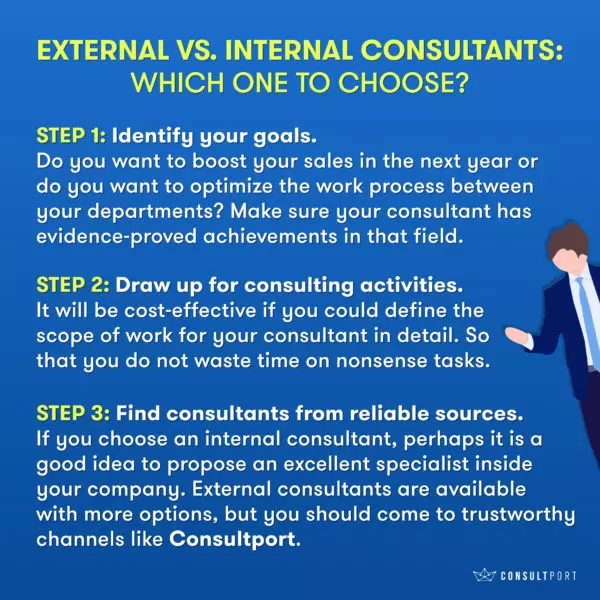External vs Internal Consultants: How to find the consultant for your need
Blog Categories:
Published:
December 11, 2022
Reading Time:
6 minutes

When your business is in some difficult situation or desiring a revolution, you might come to a consultant to receive helpful advice and recommendations.
In general, consultants are anyone with profound knowledge in a particular subject or industry, and willing to offer guidance as a solution to a problem. In business these days, the need for professional consultants is on the rise. It is an evitable trend that the competition between brands is stiffer than ever before. To be a winner in your field, you need more than hard work.
Based on the relationship with organizations, there are two typical types of consultants: Internal and external consultants. Even though they both help you run your business more efficiently in the end, some differences must be considered carefully to find the right consultant for your project.
Suppose you are still hesitant between these two. In that case, you are in the right place because, in this article, Consultport will demonstrate the distinctions between external vs internal consultants, and of course, show you some tips to identify the perfect consultant you need.
In general, consultants are anyone with profound knowledge in a particular subject or industry, and willing to offer guidance as a solution to a problem. In business these days, the need for professional consultants is on the rise. It is an evitable trend that the competition between brands is stiffer than ever before. To be a winner in your field, you need more than hard work.
Based on the relationship with organizations, there are two typical types of consultants: Internal and external consultants. Even though they both help you run your business more efficiently in the end, some differences must be considered carefully to find the right consultant for your project.
Suppose you are still hesitant between these two. In that case, you are in the right place because, in this article, Consultport will demonstrate the distinctions between external vs internal consultants, and of course, show you some tips to identify the perfect consultant you need.
What does a consultant do?
First of all, let us introduce the duties and responsibilities of a consultant in detail:
Let’s take a look at the to-do task of a consultant:
“Consultants are experts who provide advice and direction to enterprises, charities, firms, or organizations to assist them in raising productivity, resolving conflicts, and creating plans for higher staff satisfaction.” (indeed.com)
In fact, consultants can be found in every field such as Business, Education, Design, Law, Construction, etc. as long as there are demands. They are problem solvers who focus on narrowly assigned issues instead of advisors who develop lasting connections with their customers.Let’s take a look at the to-do task of a consultant:
- Evaluating current company strategies in marketing, advertising, finance, software, social media or public relations and so on
- Assisting increase employee productivity
- Offering instructions on company processes and operations
- Creating plans for better company practices or methods
- Resolving conflicts
- Executing new policies
- Improving human resources quality
KEY TAKEAWAYS
- External vs Internal Consultants are two typical types of consultants when it comes to consulting services. External consultants are hired outside to ally with your business for a period of time, while internal consultants are full-time staff who dedicate wholly to the evolution of a company.
- In order to pick up the right consultant you need, understand what your goals are, and what kinds of problems you are grappling around. Then, you will identify exactly the qualifications, skills, and experiences needed in your consultant.
- Internal consultants building strong connections with your business could address hidden issues faster, as well as know how to implement new changes into current work ethics. However, they seem to lack experience in various domains to create pragmatic solutions that actually work. The worse scenario is that they can be stuck in internal conflicts.
External vs internal consultants: A detailed comparison
Only when organizations could not resolve their issues by themself, will they decide to hire experienced consultants to find solutions. However, this could be too late because those problems have already caused enormous damage to your business. And it will take a lot of time and cost to recover completely!
Therefore, we advise you to make the correct decision right after discovering an intractable problem. To do so, we show you how external vs internal consultants distinguish from each other.
Read more. When Does Hiring a Freelance Consultant Make Sense for Your Company?
Therefore, we advise you to make the correct decision right after discovering an intractable problem. To do so, we show you how external vs internal consultants distinguish from each other.
| Aspect | External Consultants | Internal Consultants |
| Origin | A professional consultant not already hired by a corporation is considered an external consultant. | An internal consultant is a qualified advisor already employed by a business. |
| Working Time | Based on the estimated working time on the consulting contract | Working full-time as a typical staff in the business |
| Consulting Cost | Usually higher. however, the cost is estimated properly based on the consultant's ability. | Usually lower. |
| Reliability | Depends on the reputation/reviews of external consultants you are working with. That’s why you should find consultants on verified sources like Consultport. | Easier to supervisor |
| Experiences and networking | External consultants are more likely to have diverse experiences in various domains, which help them come up with inventive ideas.
However, they need time to understand the business situation. |
It is obvious that internal consultants deeply understand the working culture of the company and easily identify the issues.
Nevertheless, they can be strapped in the repeating circle and hardly find the way out. |
Pros and cons of external vs internal consultants
Cost-benefit analysis
External consultants, especially well-known firms, are renowned for their high fees. According to studies, using an internal consulting team can be up to six times less expensive than using one of the top three strategic consultancies, McKinsey & Company, Bain & Company, or The Boston Consulting Group (BCG).
Therefore, the consulting fee can be unbearable for small and medium companies. Alternatively, they can employ a talented group of internal consultants as an affordable choice.
This isn't always the case, though. A company may not need consulting all the time, so keeping an internal team on the payroll would be a waste of money. The internal consulting team might also lack the same experience that an external consultant would bring, requiring more time and resources to do the same assignment than it would with them.
In some situations, hiring external consultants might be more beneficial because the financial burden only lasts as long as the project itself, and their knowledge and resources might enable them to find solutions more quickly. External consultants' high cost is frequently justified by their extensive experience and stellar reputation. The pricing for external consultants is also various, so you can just pick the one that fits.
TIPS. You can make the most of external consultants with useful management guides here.
They could understand the challenges seamlessly, and possibly identify the potential problem areas much quicker. Internal consultants also risk being overstretched as an integral but flexible part of the organization.
Dealing in the same professional context makes internal consultants lose the novelty and excitement of tackling a new challenge. Moreover, close relationships with current staff can make it difficult for them to set up strict processes and unexpected changes. Meanwhile, external consultants are likely unaffected by these dynamics and can deal with the problem in isolation.
In some situations, hiring external consultants might be more beneficial because the financial burden only lasts as long as the project itself, and their knowledge and resources might enable them to find solutions more quickly. External consultants' high cost is frequently justified by their extensive experience and stellar reputation. The pricing for external consultants is also various, so you can just pick the one that fits.
TIPS. You can make the most of external consultants with useful management guides here.
Deep understanding of what is going on in your business
External consultants usually have no familiarity with their clients unless they have worked with them a couple of times before. Despite their good points - the ability to see issues from a different perspective, they may not be aware of internal office politics or issues, which is a drawback in communication and change implementation. As a part of the company, internal consultants may be better suited to solve conflicts related to complex internal conflicts.They could understand the challenges seamlessly, and possibly identify the potential problem areas much quicker. Internal consultants also risk being overstretched as an integral but flexible part of the organization.
Dealing in the same professional context makes internal consultants lose the novelty and excitement of tackling a new challenge. Moreover, close relationships with current staff can make it difficult for them to set up strict processes and unexpected changes. Meanwhile, external consultants are likely unaffected by these dynamics and can deal with the problem in isolation.
Expertise in various situations
As working only in a single environment, Internal consultants’ views may not be extensive compared to external consultants. An issue, which is a long-lasting pain point in an organization, can be resolved easily in another organization (with a similar situation). Thanks to experiences of collaborating with different companies, many external consultants eventually create their formulas to tackle problems based on domains, company growth periods, etc. That powerful knowledge deserves your investment.Conclusion - Which one to choose?
If you are a newborn startup with a low budget, internal consultants could be a reasonable choice. However, if your company is preparing to thrive in the market and your financial state is fine, external consultants are highly recommended.
Each type of consultant has its advantages and disadvantages. So, it is up to your current business condition.

Step 1: Identify your goals. Do you want to boost your sales in the next year or do you want to optimize the work process between your departments? Make sure your consultant has evidence-proved achievements in that field.
Step 2. Draw up for consulting activities. It will be cost-effective if you could define the scope of work for your consultant in detail. So that you don’t waste time on nonsense tasks.
Step 3. Find consultants from reliable sources. If you choose an internal consultant, perhaps it is a good idea to propose an excellent specialist inside your company. External consultants are available with more options, but you should come to trustworthy channels like Consultport.
USEFUL RESOURCES. For those who are considering hiring an external consultant, read this article for more information.
If in the end, you still cannot decide between external vs internal consultants, we (the Consultport team) are willing to be your companion to help you find consultants perfectly right for your needs. In case you opt for an external consultant, we could help organizations take on board top-tier, highly experienced consultants and digital experts to advance any project.
Each type of consultant has its advantages and disadvantages. So, it is up to your current business condition.

Step 1: Identify your goals. Do you want to boost your sales in the next year or do you want to optimize the work process between your departments? Make sure your consultant has evidence-proved achievements in that field.
Step 2. Draw up for consulting activities. It will be cost-effective if you could define the scope of work for your consultant in detail. So that you don’t waste time on nonsense tasks.
Step 3. Find consultants from reliable sources. If you choose an internal consultant, perhaps it is a good idea to propose an excellent specialist inside your company. External consultants are available with more options, but you should come to trustworthy channels like Consultport.
USEFUL RESOURCES. For those who are considering hiring an external consultant, read this article for more information.
If in the end, you still cannot decide between external vs internal consultants, we (the Consultport team) are willing to be your companion to help you find consultants perfectly right for your needs. In case you opt for an external consultant, we could help organizations take on board top-tier, highly experienced consultants and digital experts to advance any project.
Share This Story, Choose Your Platform!




